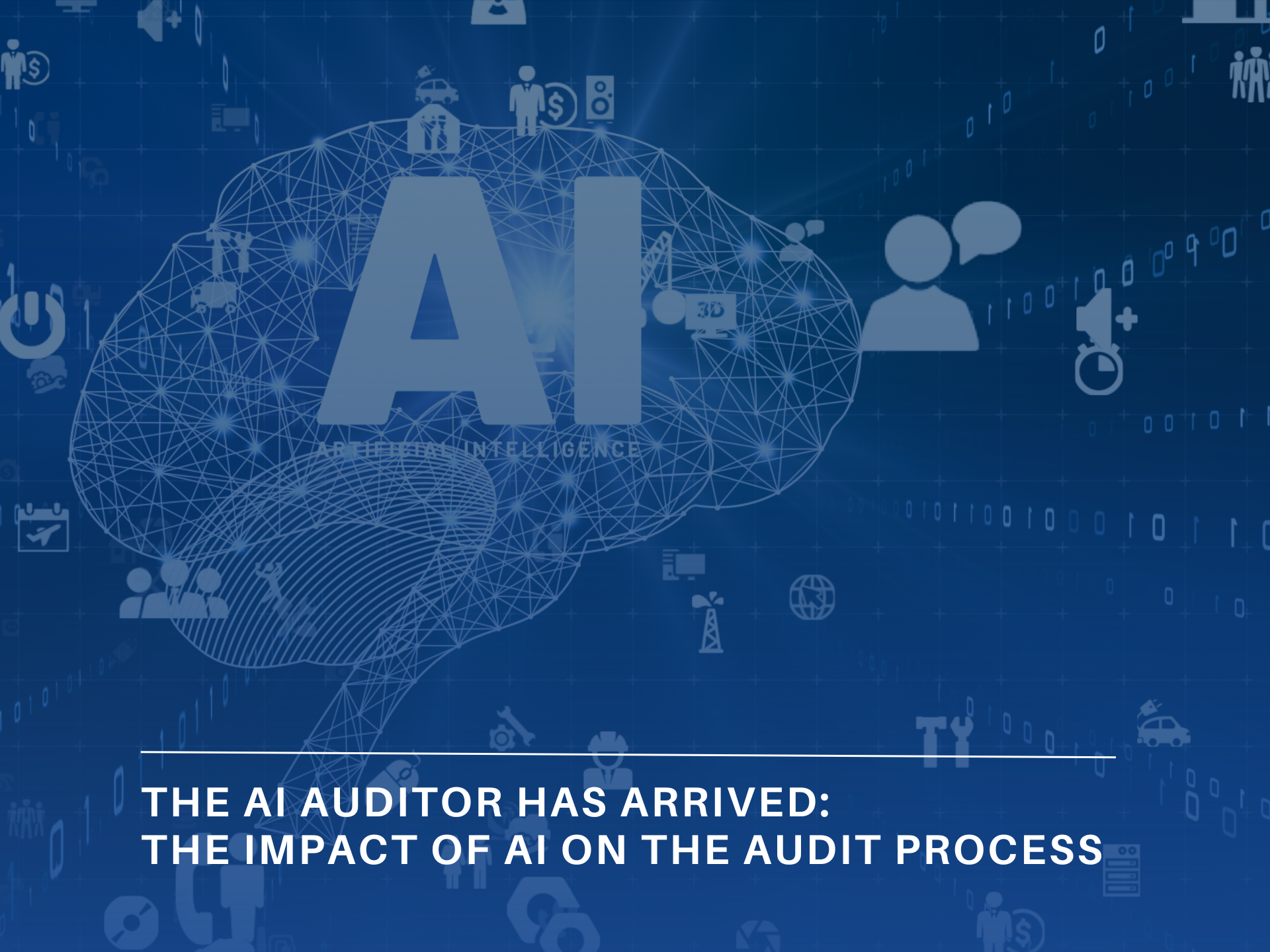
25 Jul The AI Auditor Has Arrived: The Impact of AI on the Audit Process
Introduction
The next auditor on your team might not need a desk—or a coffee break. Artificial Intelligence (AI) is rapidly transforming the audit landscape across the UK and EU. Leading firms are deploying AI-driven platforms capable of real-time transactional analysis and predictive risk modelling, fundamentally altering traditional assurance practices. This technological evolution offers significant opportunities, such as enhanced efficiency and comprehensive data scrutiny, but also introduces complex challenges, including concerns about transparency and regulatory compliance. As AI becomes integral to auditing, professionals, regulators and businesses must navigate this new terrain, balancing innovation with the imperative to maintain trust and accountability.
AI is Already Here
AI is no longer a futuristic concept in auditing; it’s actively transforming practices within the UK and EU. Leading firms have integrated AI-driven platforms into their audit processes, enhancing efficiency and insight. For instance, KPMG’s Clara platform leverages AI to provide real-time analysis and deeper insights, streamlining the audit workflow. Similarly, PwC’s Halo platform employs AI to analyse entire datasets, improving risk assessment and anomaly detection. Beyond the private sector, Estonia’s government has implemented over 130 AI projects to enhance public services, including audits, demonstrating a commitment to digital innovation. In the Netherlands, the Court of Audit has investigated AI applications within central government, providing insights into their use and associated risks. These developments underscore that AI is not merely on the horizon; it is actively reshaping the auditing landscape today
Wider Gains
And there are wider gains to be made. AI is not merely accelerating existing audit processes, but it is fundamentally transforming them, offering deeper insights, fostering proactive risk management, and redefining the auditor’s role in the modern business environment.
Transformational Gains:
Comprehensive Data Analysis: Traditional audits often rely on sampling methods, examining a subset of data to infer conclusions about the whole. AI enables full-population analysis, scrutinising every transaction within a dataset. This exhaustive approach enhances accuracy and reduces the risk of oversight.
Predictive Analytics for Risk Assessment: AI’s predictive capabilities allow auditors to move beyond historical evaluations, forecasting future risk patterns. By analysing trends and anomalies in large datasets, auditors can proactively identify potential issues before they materialise, thereby enhancing risk management strategies.
Natural Language Processing (NLP) in Contract Reviews: NLP technology empowers auditors to efficiently review complex contracts and written statements, automating the detection of inconsistencies or fraudulent clauses. This not only streamlines the review process but also bolsters the detection of subtle irregularities that might elude manual examination.
Evolving Auditor Roles:
As AI takes on more analytical tasks, auditors are transitioning from traditional number-checking roles to becoming strategic data interpreters. This shift necessitates a new skill set, with AI literacy becoming essential. Audit professionals must now understand and leverage AI tools effectively, ensuring that technological insights translate into meaningful business decisions.
Enhancing ESG Reporting:
With the EU’s Corporate Sustainability Reporting Directive (CSRD) imposing stringent environmental, social, and governance (ESG) reporting requirements, AI tools are proving invaluable. They facilitate the accurate tracking and reporting of carbon emissions and other ESG metrics, ensuring compliance and providing stakeholders with transparent, reliable data.
The Challenges: Black Boxes and Biases
While AI undoubtedly offers transformative potential in auditing, it also introduces several challenges that warrant careful consideration.
Transparency and Trust: A significant concern is the “black box” nature of many AI models, where the decision-making processes are opaque. This lack of transparency conflicts with fundamental audit principles that require traceability and explainability. Auditors must be able to understand and justify the conclusions drawn by AI systems to maintain stakeholder trust.
Regulatory Tension: Regulatory bodies in the UK and EU, such as the Financial Reporting Council (FRC), are emphasising the need for high-quality audit standards and ethical considerations. There are growing concerns that AI-driven decisions may not be adequately documented, making it challenging to review and ensure compliance with established regulations.
Bias and Data Quality: AI systems are only as reliable as the data they are trained on. If the underlying datasets contain biases, the AI’s outputs will likely perpetuate these biases, leading to skewed or unfair outcomes. Ensuring the quality and representativeness of training data is crucial to mitigate this risk.
Skills Gap: The integration of AI into auditing necessitates a workforce proficient in both traditional auditing practices and modern technological competencies. However, not all audit professionals possess the requisite training to understand or challenge AI-generated outputs. Addressing this skills gap is essential to effectively leverage AI tools and uphold the integrity of the audit process.
While AI has the potential to revolutionise auditing, it is imperative to address these challenges to ensure that its implementation enhances, rather than undermines, the quality and reliability of audits.
Between Caution and Innovation
The integration of AI into auditing is prompting a complex interplay between innovation and regulation within the UK and EU.
UK Context:
The FRC has proactively addressed AI’s role in auditing by establishing the Technology Innovation Panel. This initiative aims to explore and provide guidance on emerging audit technologies, including AI, to ensure they align with existing quality standards and ethical considerations. UK firms now face the dual challenge of integrating advanced technologies while adhering to established regulatory frameworks, necessitating a careful balance between innovation and compliance.
EU Initiatives:
In August 2024, the European Union enacted the Artificial Intelligence Act (AI Act), introducing a comprehensive regulatory framework for AI applications. The Act categorises AI systems used in auditing as “high-risk,” imposing stringent requirements for transparency, human oversight and accountability. This classification significantly impacts cross-border audits and the engagement of third-party AI vendors, compelling firms to rigorously evaluate their AI systems and ensure compliance with the new standards
What’s Next for the AI Auditor?
AI is set to redefine the auditing profession, not by replacing human auditors but by transforming the nature of their work. The future points towards hybrid audit teams, where human expertise combines with machine efficiency to enhance audit quality and depth. AI will handle data-intensive tasks, allowing auditors to focus on complex judgments and strategic insights.
This evolution necessitates a shift in skill sets. Auditors will need to develop AI literacy, leading to the emergence of new audit certifications focused on data science and AI technologies. Several organisations are already offering credentials such as the AI Audit certification to equip professionals with the necessary competencies.
Moreover, the demand for explainable AI (XAI) in audit software is increasing. Stakeholders require transparency in AI-driven decisions to maintain trust and ensure compliance with regulatory standards. Developing AI systems that provide clear, interpretable outputs will be crucial.
A significant transformation on the horizon is the shift from traditional periodic audits to continuous auditing. AI enables real-time monitoring of transactions and controls, facilitating ongoing assurance rather than annual reviews. This approach allows for the immediate detection and rectification of anomalies, enhancing the overall robustness of financial oversight.
Embrace the Change
The AI auditor is no longer a concept of the future but a present reality, marking a pivotal evolution in the auditing profession. Embracing this change requires more than the mere adoption of AI tools; it demands a fundamental rethinking of audit methodologies, policies, and skill sets. Success will hinge on integrating technological advancements with human judgment to uphold and enhance the integrity and effectiveness of the audit process.
Related Training Programmes
Related Training Programmes











